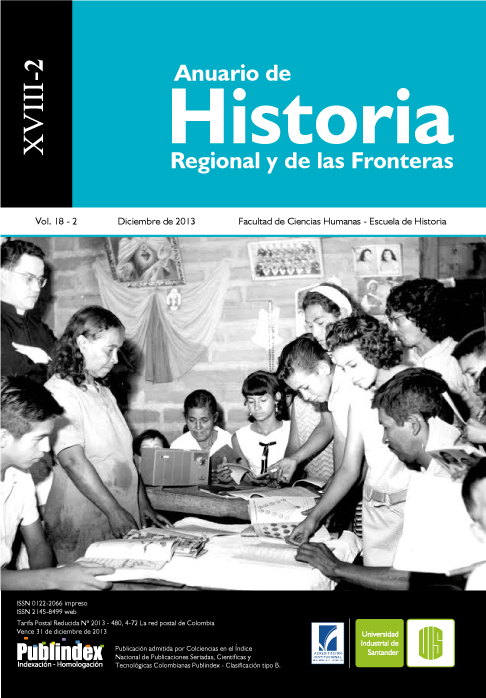Voices against silence, memory against forgetting life trajectories of 25 victims of forced displacement based in the neighborhood Café Madrid Bucaramanga
Published 2013-10-29
Keywords
- History of life,
- oral history,
- grounded theory,
- reasoned memory,
- social networks
- gender violence ...More
How to Cite
Abstract
Colombia has been suffering an armed conflict since five decades ago. This paper is focused in giving a voice to the victims, in giving them courage to defeat fear, to heal wounds and to find out their truth. We built and analyzed, in cooperative way, the history of the life of 25 victims of forced displacement, they’re located in Café Madrid, Bucaramanga. They understood that his narrative helps them to build a reasoned memory, to break the silence, to evidence the apathy or acquiescence from society and state. They also contribute to reach justice, integral reparation, guarantee of nonrepetition and reconciliation towards a long and stable peace This research has a theoretical and methodological approach of oral history, biographical approach and grounded theory. Also there’s a category analysis of internal armed conflict, forced displacement, gender violence, social networks and memory.
Within the stories are spotted actors in conflict, their interests, their behaviors, their links with the establishment, their strategies in order to achieve control of the people and territories, the ways for destroying individual and collective life projects, the winding roads from their homes to their current locations and their losses along the way.
We realized the need of Resignify the Café Madrid Train Station in order to, as a reparation, it become a collective memory place.
Downloads
References
Fuentes primarias
Entrevistas
Conversación telefónica con el Entrevistado no 25, 19 diciembre 2012.
Entrevistas no 1, 2, 3, 7, 9, 10, 12, 13, 14, 17, 20, 22.
Fuentes secundarias
AGENCIA PRESIDENCIAL PARA LA ACCIÓN SOCIAL Y LA COOPERACIÓN INTERNACIONAL, ACCIÓN SOCIAL, 2010, URL: http://www.accionsocial.gov.co/Estadisticas/SI_266_Informacion%20PAG%20WEB%20(4-08-2010)%20ver%202.htm. Consultado: 15/01/2012.
AGENCIA PRESIDENCIAL PARA LA ACCIÓN SOCIAL Y LA COOPERACIÓN INTERNACIONAL, ACCIÓN SOCIAL, 2009. Estadísticas de la población desplazada: registro único de población desplazada. URL: www.accionsocial.gov.co. Consultado: 20/01/2010.
Alto Comisionado de las Naciones Unidas para los Refugiados, “Boletín humanitario Colombia”. ACNUR Número 4, abril 2012, pp. 1-5, URL: http://www.acnur.org/t3/uploads/media/OCHA_Colombia_-_Boletin_Humanitario_-_Abril_2012.pdf?view=1. Consultado: 15/01/2012.
BARELA, Liliana et al, Algunos apuntes sobre Historia Oral. Buenos Aires, Instituto Histórico de la Ciudad de Buenos Aires, 2004.
BAYONA, M, NIÑO, J., Del camino de Paturia al ferrocarril de Santander. Bucaramanga, SIC Editorial, 2002, 157 p.BOURDIEU, Pierre, Las reglas del arte: Génesis y estructura del campo literario. Barcelona, Anagrama, 1995, 384 p.
CONSULTORÍA PARA LOS DERECHOS HUMANOS Y EL DESPLAZAMIENTO – CODHES, 2010, “Boletín Número 78”, Bogotá, Quito, 19 septiembre 2011, s.p., URL: www.codhes.org. Consultado: 12/01/2012.
GENOLET, Alicia et al, “Trayectorias de vida y prácticas maternales en contextos de pobreza”. Ciencia, docencia y tecnología. N° 38, Año XX, Concepción, Uruguay, 2009, pp. 13-35.
GLASER, B. y STRAUSS, A., The discovery of Grounded Theory: Strategies for qualitative research. New York: Aldine publishing Company, 1967.
LEGEWIE, H. y SCHERVIER-LEGEWIE, B., “Anselm Strauss en conversación con Heiner Legewie y Barbara Schervier-Legewie”. Forum Qualitative Social Research, Vol. 5(3), Art. 22, 2004. URL: http://nbn-resolving.de/urn:nbn:de:0114-fqs0403222. Consultado: 08/07/2011.
MALLIMACI F. y GIMÉNEZ B., “Historias de vida y método biográfico”. Estrategias de Investigación Cualitativa. Barcelona, Gedisa, 2006.
MORALES MARTÍNEZ, José Daniel, FANDIÑO MARTÍNEZ, Yenifer Miladys, “Y Dios me hizo mujer”: Desplazamiento forzado y vulnerabilidad de género. En Revista de Estudos e Pesquisas sobre as Américas, Vol. 2, Nº 1, Janeiro-Junho 2008, pp. 1-12, URL: http://seer.bce.unb.br/index.php/repam/article/view/1466/1099. Consultado: 11/06/2012.
MOTTA, Nancy, “Las nuevas tribus urbanas en Cali. Desplazamiento forzado y desterritorialización y reterritorialización”. En Revista Historelo, Vol. 1, No. 2. Bogotá, 2009, pp. 33-85.
MUÑOZ, Federico, Reconstrucción de las trayectorias de vida de tres víctimas de destierro. Estudios de caso. Trabajo de grado de la Maestría en Sociología. Cali, Universidad del Valle, Escuela de Trabajo Social y Desarrollo Humano, 2010, 33 p.
NARANJO Gloria (2006). “Desplazamiento forzado y Reasentamiento involuntario. Estudio de caso: Medellín 1992-2004”. El Desplazamiento en Colombia. Regiones ciudades y políticas públicas. Bogotá, REDIF, ACNUR, Universidad Nacional de Colombia, Corporación Región, pp. 77-100.
NORA Pierre, Les lieux de mémoire. Montevideo, Trilce, 2008, 199 p.
ORGANIZACIÓN DE NACIONES UNIDAS, Comité Ejecutivo del Programa del Alto Comisionado, Information Note on UNHCRs Guidelines on the Protection of Refugee Women (EC/SCP/67), Nueva York, Naciones Unidas, 1991, pp. 32-33.
PINILLA, Maribel, RODRÍGUEZ, Sandra, Cambios en las condiciones, trayectorias y proyectos de vida de las y los jóvenes en situación de desplazamiento asentados en Bogotá. Trabajo de grado para optar el título de Magistras en Política Social. Directora: Martha Lucía Gutiérrez Bonilla, Bogotá, Pontificia Universidad Javeriana, 2010, 152 p.
RODRÍGUEZ GONZÁLEZ, Alfonso, IÑAKI MÁRKEZ, Alonso, FERNÁNDEZ LIRIA, Alberto, PÉREZ-SALES, Pau (coordinadores), “Violencia y salud mental y violencias institucional, estructural, social y colectiva”. En I Congreso InternacionalConstruyendo Redes, Grupo de Acción Comunitaria. Mesa Redonda El concepto de víctima, abril-mayo 2008, pp. 37-42.
RODRÍGUEZ, José, Las fuentes orales: Metodología para trabajar con una fuente que buscas y te busca. Madrid, Universidad Rey Juan Carlos, 2008.Servicio Jesuita a Refugiados-Colombia. “Los efectos del desplazamiento forzado en la mujer colombiana”. Colmujeres, URL: https://www.jrs.net/assets/Regions/IOR/media/files/colmujeres.pdf
SLUZKI, Carlos E., La red social: fronteras de la práctica sistémica. España, Colección terapia familiar – Gedisa Editorial, 1998, 162 p.
SUÁREZ, Ivonne, ARDILA, Esaú, BÁEZ, Juan S., RUEDA, Juna F., “Estudio de Trayectorias de Vida de Personas en Situación de Desplazamiento Forzado Interrelacionadas en el Barrio Café Madrid del Municipio de Bucaramanga”. Proyecto COLCIENCIAS, Universidad Industrial de Santander, COMPROMISO, 2010.
VANGUARDIA LIBERAL, “Alarmante aumento de desplazados en la ciudad”. Vanguardia.com, 29 de mayo 2009, URL: http://www.vanguardia.com/historico/29550-alarmante-aumento-de-desplazados-en-la-ciuda. Consultado: 15/01/2012.

